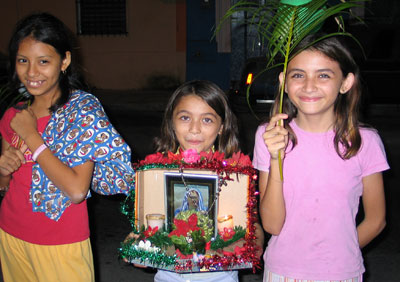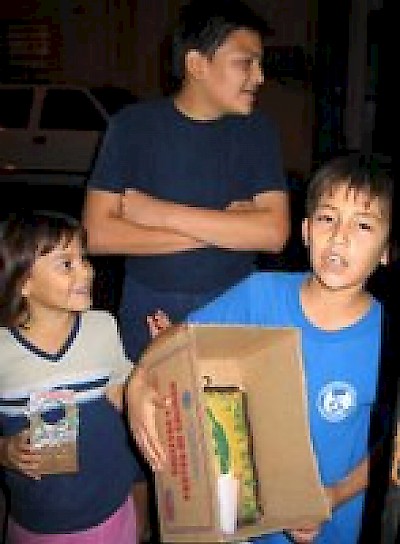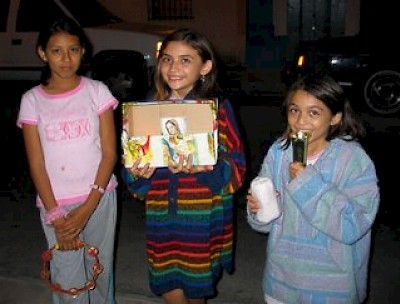Rama Rama
These words used to conjure up visions of Hare Krishna, orange robes and George Harrison for us, but now they mean something totally different.
In the rest of Mexico, they have posadas, ritual walks through the streets with candles and song, children dressed up like Mary & Joseph, visiting neighborhood houses and being "refused a place at the inn" in remembrance of the journey so long ago in Bethlehem.
Here in the Yucatan, this ritual has a little trickster twist to it. Here in the Yucatan, they have Las Ramas. Ramas means "branches" and the little visitors all hold branches, so that must be where they get their name.
Each night during Advent (the 24 days leading up to Christmas), children of the neighborhood travel from door to door singing a song and collecting money. With them they carry las ramas as well as a picture of the Virgin of Guadalupe, somehow set up with a candle. In the case of our young visitors the other night, it was a little box, with flowers and candles in front of the Virgin. Our employee Fernando who is 24 years old tells us that he used to take big empty cans and cut out both ends. On one end he would put a picture of the Virgen and then he would stick a candle in the other end to make a sort of light box. He has promised to have his sobrinos (cousins) make one for us.
In this tradition, the children go door to door in their neighborhood, singing this song. They sing or shout it very quickly so that its almost impossible to tell what they are saying (to these gringos, anyway), so we had Fernando write it down for us:
Me paro en la puerta (I stand in the door)
Me quito el sombrero (I take off my hat)
Porque en esta casa (Because in this house...)
Vive un caballero (lives a gentleman.)
Vive un caballero, (Here lives a gentleman)
Vive un general (Here lives a general)
Si nos da permiso (If you give us permission)
Para comenzar. (We will begin)
(change of cadence....certainly there's no melody that we can hear)
Naranjas y limas (oranges and limes)
Limas y limones (limes and lemons)
Aqui esta la Virgen (here is the Virgin)
De todos las flores (of all the flowers)
En un jacalito (in a little shack)
De cal y de arena (of "cal" (the type of paint used here) and sand)
Nacio Jesucristo (Jesus was born)
Para Noche Buena (For Christmas Eve)
A la media noche (at midnight)
Un gallo canto (a rooster crowed)
Y ese gallo dijo: (and that rooster said)
"Cristo ya nacio!" (Christ is born!)
(another change of cadence)
La calaca tiene un diente (The skeleton has a tooth)
Tiene un diente.
Topogigio tiene dos (Topo Gigio...yes, the little mouse on Ed Sullivan....has two)
Si me da un aguinaldo (If you give me an "aguinaldo"....a bit of money or a Christmas bonus)
un aguinaldo,
Se lo pagará el Señor (You will pay it to the Lord)
Se lo pagará el Señor.
If you give them a little money (which of course we did...), they sing:
Ya se va la rama (The rama is going now...)
Muy agradecida (very grateful)
Porque en esta casa (because in this house)
Fue bien recibida (it was well received.)
Pases buenas noches (Have a good night)
Esta le deseamos (this we hope for)
Pase buenas noches
Nosotros nos vamos (we're going)
If you don't give them money, we hear they yell at you:
Ya se va la rama (The rama is going now...)
Muy desconsolada (very desconsolate)
Porque en esta casa (because in this house)
No la dieron nada (they didn't give anything).
Fernando also tells us they hurl insults at you, and possibly limones, at that point.
The first night, these three adorable girls came to call. The next night, they came again, and another group from across the street (all brothers and sisters) also came. They come about 7 pm and we aren't always here at the office that late. But Fernando tells us they will be back every night until Christmas Day. So we're saving our coins. On reflection, this tradition seems to combine Christmas and Halloween. The kids go to the effort of putting together a little show (very little, in the case of our second group...) and performing a song. If they get their treat, everybody wins. But if not, tricks and insults and limones start flying.
Where does the money go, you ask? To buy firecrackers and candy, of course!!










Comments
Working Gringos 11 years ago
SO glad we could help in that situation!! What a treat!
Reply
jim 11 years ago
We were visited last night, on our first night here in Akumal. So glad I found this story so I knew what exactly was going on and so glad I gave them a little money!
Reply
Yucatan Living » Culture » Christmas Posada in Merida 14 years ago
[...] many years around this time, we have enjoyed the nightly visits of neighbor children singing the Rama, Rama song in exchange for a few pesos. The night of our posada we learned that this tradition is a [...]
Reply
Yucatanmama 16 years ago
We had them last night for the first time in Chuburna. Very cute, and now that I know what the song is about, it makes more sense. What I really want to know is where do they get the good firecrackers? LOL
Reply
Kellii 18 years ago
yess it was an extra credit [project and only 2 pple took upon the thought of it me and my bff...my profosaura gave me a mil.. haha good espanol right?
Reply
CasiYucateco 18 years ago
How about "Dios botik"? The same as "Se lo pagará el Señor"? I think the common meaning is "Thank you" but isn't the literal meaning "God pays it" / meaning "God will pay you back (for me)" or something similar....?
Just thought this was a good time to ask for help with that one.
P.S. Way to go Kellii. Hope your project gets a good grade!
Reply
Kellii 18 years ago
i had to do a projest and i had no idea what a la rama was and now i know thanks
Reply
Kellii 18 years ago
yes i am in the 7th grade and i have to do a project about a La Rama. this helped me out a lot. i had no idea what it was
thanks
Reply
Working Gringos 18 years ago
Yes, we asked our Yucatecan employees, and it means "The Lord will pay you back".
Reply
Anny 18 years ago
I get all those object pronouns and indirect pronouns mixed up, but I THINK "Se lo pagará el Señor" means the lord will pay YOU. Much nicer idea, anyway, the kind of payback we're all hoping for! ;-) Ask around...I'd like to know too. I just had three groups singing at my door this evening...where are we going to find all that change?
Reply
Working Gringos 19 years ago
We stand corrected. Thank you!
Reply
(0 to 11 comments)Next »